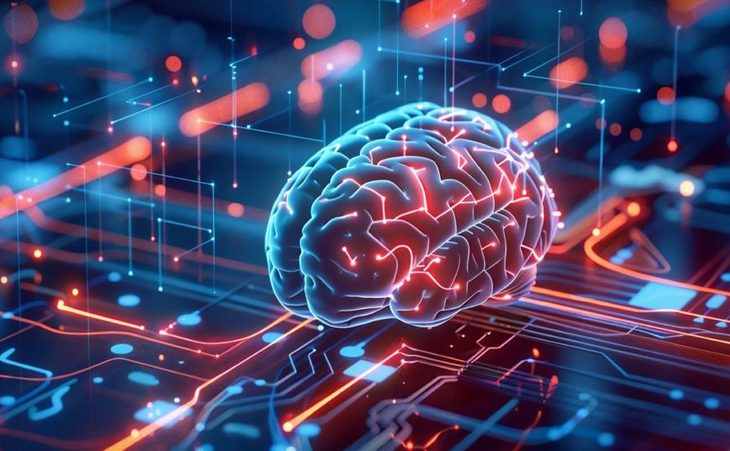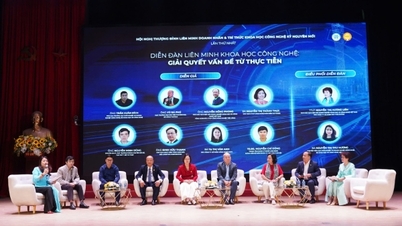
Quantum AI is the combination of artificial intelligence and quantum computing.
Quantum AI is the combination of artificial intelligence and quantum computing, which exploits the parallel processing power of quantum bits (abbreviated as qubits) to accelerate and improve the efficiency of machine learning.
While AI allows machines to learn from data and make decisions like humans, quantum computing – with its quantum superposition and entanglement – enables millions of calculations to be processed simultaneously.
This combination opens up breakthrough potential in areas requiring extremely high computational power such as complex optimization, bio-simulation, real-time big data analytics and deep learning, where traditional AI is reaching its limits.
Quantum Computing - A Boost from Technology Infrastructure
Quantum computing replaces traditional bits with qubits - special units of information that can exist in multiple states simultaneously thanks to the phenomenon of quantum superposition . Thanks to that, quantum computers can represent and process information in a superior parallel way, opening up unprecedented computing power.
This offers clear advantages in solving complex combinatorial problems, multivariate optimization, and simulating quantum physical phenomena that are very similar to problems in artificial intelligence. These areas have always been a major challenge for classical computers due to the scale and nonlinearity of the data.
The quantum algorithm ecosystem is growing rapidly. Algorithms such as Quantum Support Vector Machine (QSVM) or Quantum Neural Networks (QNN) are opening up the possibility of building more sophisticated and efficient machine learning models.
In addition, Quantum Annealing technique helps accelerate the machine learning process, especially in optimization and reinforcement learning problems - where AI needs to make intelligent decisions in complex and constantly changing environments.
These advances not only promise to improve big data processing performance, but also push the boundaries of AI, bringing it closer to being able to handle complex systems beyond the imagination of traditional computers.
Medical applications

Quantum AI could shorten the process of discovering new drugs and predict accurate results
With the ability to simulate complex interactions at the molecular and cellular level, quantum AI helps researchers gain deeper understanding of disease mechanisms and drug action.
One of the most prominent applications is to shorten the time it takes to discover and develop new drugs. Instead of spending years testing millions of molecules, quantum AI allows for fast and accurate simulations of protein structures, molecules, and biological interactions – something that classical computers have difficulty performing efficiently. This not only reduces research costs but also speeds up the process of bringing potential drugs to the clinical trial stage.
In addition, quantum AI also supports improving accurate diagnosis through the analysis of medical imaging data and large medical records, helping to personalize the most appropriate treatment for each patient. It is also expected to improve efficiency in epidemiological management, disease forecasting and optimizing medical care processes.
Applications in finance

Quantum AI pricing derivatives, which requires modeling multiple risk and probability factors
The modern financial industry is one of the most complex fields where data fluctuates in real time and investment decisions need to be made in a split second.
With the ability to analyze millions of asset combinations and constraints in a short period of time, quantum AI helps investors find the optimal allocation structure, balancing profits and risks more accurately.
Additionally, thanks to parallel processing and reinforcement learning, quantum AI can detect unusual trading patterns and signs of risk hidden deep within the system – something that traditional algorithms can easily miss.
Additionally, quantum AI contributes to derivatives pricing , which requires modeling multiple risk and probability factors. Quantum simulation capabilities enable more realistic pricing models to be built, supporting fast and accurate investment decisions.
Applications in logistics

Quantum AI can shorten computation times, optimize multi-objective models
Global supply chains are becoming more complex than ever, with millions of shipping points, time, cost, weather, and demand variables that change by the minute. Traditional optimization problems—like finding the shortest route, allocating inventory, or dispatching vehicles in real time—are beyond the capabilities of classical AI in many cases.
With the ability to solve complex combinatorial problems thanks to the parallel power of qubits, quantum AI can shorten computation time from hours to seconds , especially in multi-objective optimization models.
For example, in delivery fleet management, quantum AI helps to plan optimal transportation in real time, reducing fuel costs while ensuring on-time delivery. In warehousing, it helps to simulate and arrange the flow of goods in the most efficient way, limiting congestion and increasing productivity.
Quantum AI also helps forecast seasonal demand, simulate supply chain disruptions , and come up with rapid response scenarios - which is especially useful in emergency situations like pandemics or global logistics crises.
The Quantum Future: Not Near But Not Far
Current quantum computers are still in the experimental stage, with limited qubit numbers, low stability and extremely demanding hardware infrastructure requirements. Quantum noise, computational errors and high maintenance costs still make mass adoption a major challenge.
However, giants like IBM, Google, D-Wave, Rigetti and many independent research labs are investing heavily to expand quantum capacity, increasing the number of qubits exponentially and improving system durability.
Hybrid computing models – combining classical and quantum AI – are emerging as a viable transition solution, helping to harness some of the quantum power while the infrastructure is still in its infancy.
With much effort, quantum AI promises to change the way humans tackle the great challenges of our time.
Source: https://tuoitre.vn/ai-luong-tu-va-cuoc-cach-mang-trong-y-te-kinh-te-logistics-20250605110531932.htm


![[Photo] Cat Ba - Green island paradise](/_next/image?url=https%3A%2F%2Fvphoto.vietnam.vn%2Fthumb%2F1200x675%2Fvietnam%2Fresource%2FIMAGE%2F2025%2F12%2F04%2F1764821844074_ndo_br_1-dcbthienduongxanh638-jpg.webp&w=3840&q=75)
![[Photo] 60th Anniversary of the Founding of the Vietnam Association of Photographic Artists](/_next/image?url=https%3A%2F%2Fvphoto.vietnam.vn%2Fthumb%2F1200x675%2Fvietnam%2Fresource%2FIMAGE%2F2025%2F12%2F05%2F1764935864512_a1-bnd-0841-9740-jpg.webp&w=3840&q=75)



































































































Comment (0)